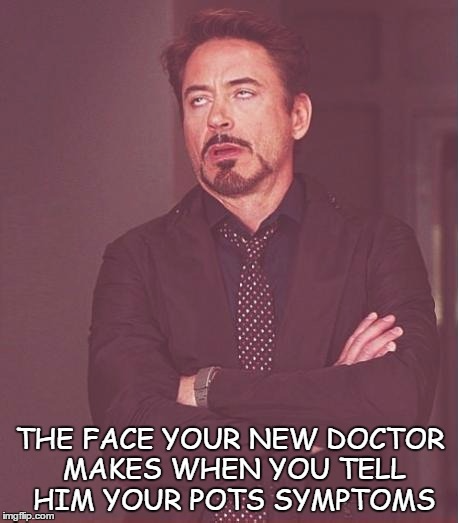 One of the things POTS patients struggle with the most is getting their initial diagnosis. Many have done research online and already suspect POTS, but do few doctors are aware of the condition, its symptoms and effects, that they dismiss a POTS diagnosis.
One of the things POTS patients struggle with the most is getting their initial diagnosis. Many have done research online and already suspect POTS, but do few doctors are aware of the condition, its symptoms and effects, that they dismiss a POTS diagnosis.
So how do you get a doctor to take you seriously? After all, it may have taken you months or years to come this far yourself. How do you present the journey you have been on to get to this point in a way that convinces a health professional you don’t know to join in your fight?
First, consider interviewing a few doctors if you can. Doctor’s offices are accustomed to meet-and-greet type appointments, where a patient comes in to talk about their medical issues and their needs before seeking treatment. Just call the offices and ask for a patient interview.
Second, print off copies of all the medical information you have, including diagnoses, tests, and other materials. Organize it in a way that makes sense, either chronologically or by types of tests. Label everything.
Create a summary page that lists all current diagnoses, treatments, and symptoms. Include things you have tried that failed and why. Include every type of treatment you have tried, not just medications, and what the result was. Chart all your symptoms for a month before your visit.
Try writing an introduction that includes what you want to say when you talk to the doctor. Include your most troubling symptoms and how they affect daily life. Let the doctor know what progress would look like to you so they don’t feel like it’s all or nothing. Have a list of questions for the doctor so you can hear how they would approach things.
Here’s a list of physicians that specialize in dysautonomic conditions. But if you can’t find one near you or in your insurance network, don’t despair. If you can connect with a doctor who is willing to trust you, communicate with you, and believe in you, then you can begin to unravel the web that is POTS and take control of your life.
The POTS and Dysautonomia Treatment Center offers patients collaborative, alternative care aimed at treating the whole person, not just the disorder. Our team consists of a psychophysiologist, an internal medicine doctor, clinical health psychologist, and a registered dietitian who work with you to provide compassionate care through a full range of services.
Our treatment options include onsite intensives in Dallas, as well as online options you can complete anywhere. Are you ready to take control of your symptoms? Read more about our treatment options.
